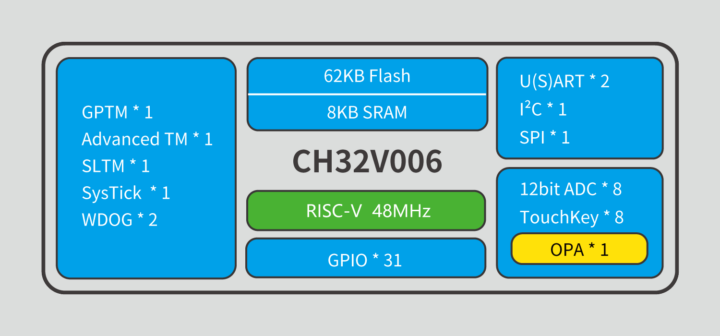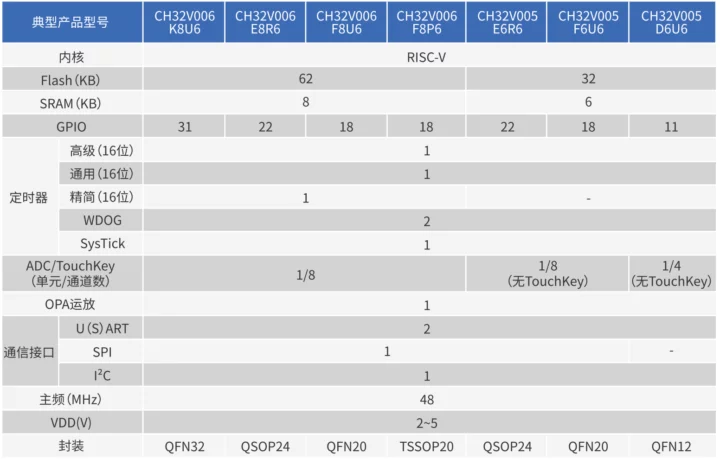WCH CH32V006 RISC-V microcontroller is an upgrade to the 10-cent CH32V003 microcontroller with more I/Os, up to four times the memory, storage, a wider supply voltage range, the addition of a TouchKey interface, as well as a new 32-bit V2C RISC-V core instead of the V2A core found in the CH32V003.
More specifically that means we went from the CH32V003 with 2KB SRAM and 8KB flash, up to 8KB SRAM and 62KB for the CH32V006, and 6KB SRAM and 32KB flash for the CH32V005, a smaller sibling of the new RISC-V microcontroller.

WCH CH32V005 & CH32V006 specifications (with highlights in bold to show differences against CH32V003):
- CPU – 32-bit “RISC-V2C” core up to 48 MHz
- Memory – 6KB SRAM (CH32V005) or 8KB SRAM (CH32V006)
- Storage – 32KB flash (CH32V005) or 62KB flash (CH32V006)
- Peripherals
- Up to 31x GPIO with interrupt support (CH32V003 had up to 18x GPIO)
- 2x USART interfaces
- 1x I2C
- 1x SPI
- 12-bit ADC up to 8 channels; TouchKey interface (CH32V006 only)
- 1-wire or 2-wire debug interface
- Operational amplifier (OPA)
- General purpose DMA controller
- Timers
-
- 16-bit advanced timer
- 16-bit general-purpose timer
- 16-bit “simplified” () timer (CH32V006 only)
- 2x watchdog timers
- 32-bit system timer
-
- Misc – 96-bit chip unique ID
- Supply voltage – 2V to 5V (CH32V003 was 3.3V or 5V)
- Low power modes – Sleep, standby
- Power on Reset (POR), programmable voltage detector
- Packages
- CH32V005 – QFN12, QFN20, QSOP24
- CH32V006 – TSSOP20, QFN20, QSOP24, QFN32
We can see some packages are the same as the CH32V003, but they may not be pin-compatible considering the extra interfaces. There’s no product page just yet and the datasheet is not available. The new CH32V005/6 microcontroller showed up in the product guide (PDF) and Patrick Yang, CTO at WCH, tweeted (X’ed?) about the upcoming CH32V006 MCU providing a few extra details and offering free samples to those interested. More information and documentation should surface once the new MCUs get closer to mass production.
Thanks to David for the tip.

Jean-Luc started CNX Software in 2010 as a part-time endeavor, before quitting his job as a software engineering manager, and starting to write daily news, and reviews full time later in 2011.
Support CNX Software! Donate via cryptocurrencies, become a Patron on Patreon, or purchase goods on Amazon or Aliexpress






The info for the 002/004 and 007/M007 has been released as well. The 002/4 are more similar to the 003 but with a wider Vcc range. The 007 has some enhancements for motor control (higher voltage tolerance). The 002 has 16K/4K while the 004 has 32K/6K. The 007 has 62K/8K. I haven’t finished the 007 datasheet, yet.
Seems the 007 adds some comparators while the M adds to that with some high voltage input (up to 56V?), some high speed comparators hooked to various peripherials, and three channels each of high voltage gate drive and low voltage gate drive. Looks like it’s good for DC motors, quadrature (stepper) motors, and BLDC style three phase motors.
It’s hard to tell the limits with the machine translated version of the DS. But the M007 seems to be a very specialized version of the 007. Normally WCH names specialized chips as CHXXX. This may be a change for them.
Ha! Neat. A project I am working on could use a cheapo 2V MCU. It’s remotely powered (no battery) and usually anything above 3v is unattainable. Due to the nature of the project, I don’t want to add a boost converter. This could be a great replacement for the stm32l011 I am using now. Let’s hope it’s launched in the foreseeable future.
The A/D isn’t spec’ed for 2V, you need a Vcc of 2.4V, so beware of that if your application needs A/D.